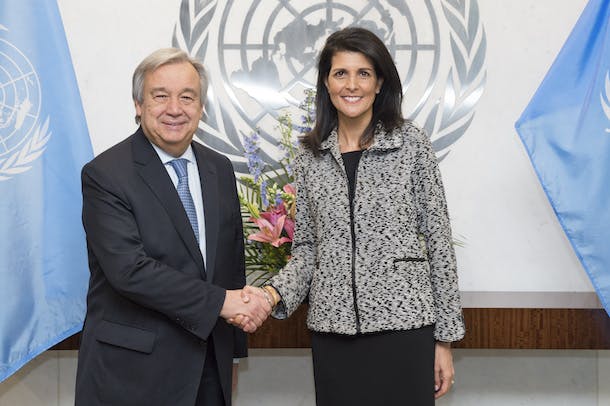
It’s going to be a blockbuster week on Capitol Hill for the U.S.-UN partnership with U.S. Ambassador to the UN Nikki Haley testifying before the House Foreign Affairs Committee and the House Appropriations Committee on the proposed funding levels for the UN in 2018 on July 27 and 28. This will be Ambassador Haley’s first public appearance on Capitol Hill since her confirmation hearing.
Over the past six months, Ambassador Haley has formed a close working relationship with UN Secretary-General António Guterres, and together, they are a determined force to advance UN reform. However, her important agenda could face an uphill climb should the U.S. fall short on paying its bills to the organization.
These unfortunate circumstances aren’t too far off from becoming a reality. As you may remember, the Administration’s budget request, which was submitted to Congress last month, called for deep cuts to a number of UN-related accounts, including UN Peacekeeping, UN Women, the UN Development Program (UNDP), the International Atomic Energy Agency (IAEA), and even the UN’s Children Fund (UNICEF).
When the Administration’s budget was released, Ambassador Haley stated that the proposal was just “starting the conversation. … It doesn’t mean that’s where it will end up.” She later added that the proposal was “going through the budget process within Congress.”
As she correctly stated, the power of the purse does sit on Capitol Hill. Therefore, Haley’s testimony this week will be one of the most important deciding factors in the UN’s budget for the next year.
Below are five top questions we can expect Members of Congress to ask Ambassador Haley in the upcoming budget hearings:
- Can the U.S. truly maintain its commitment to lead an aggressive reform agenda at the UN alongside Secretary-General Guterres if we fail to meet our financial obligations to the organization?
- Republicans and Democrats, including a range of former U.S. ambassadors to the UN, have been united in calling the UN an indispensable organization and stressing that cutting our contributions would be counter-productive to our own interests. What are your views on this?
- Secretary of State Tillerson and President Trump have frequently mentioned the need for other countries to pay their fair share in international organizations. The UN budgetary system is already set up to ensure countries step up, not stand by. Are you concerned that the cuts outlined in the budget may lead other countries to reduce their own share?
- U.S. military leaders agree that UN Peacekeeping missions are cost-effective and vital to U.S. national security interests, however, the proposed budget cuts peacekeeping by 37%. Do you think that the proposed cuts are productive to the U.S. mission’s ongoing review of existing UN Peacekeeping missions?
- We are currently facing the largest refugee crisis since World War II and four looming famines. Amid the proposed budget cuts to a variety of UN agencies, what steps is the U.S. planning to take to remain a leader in humanitarian assistance around the world?
Follow @BetterWorldOrg on Twitter for live updates from the hearings.



 View All Blog Posts
View All Blog Posts